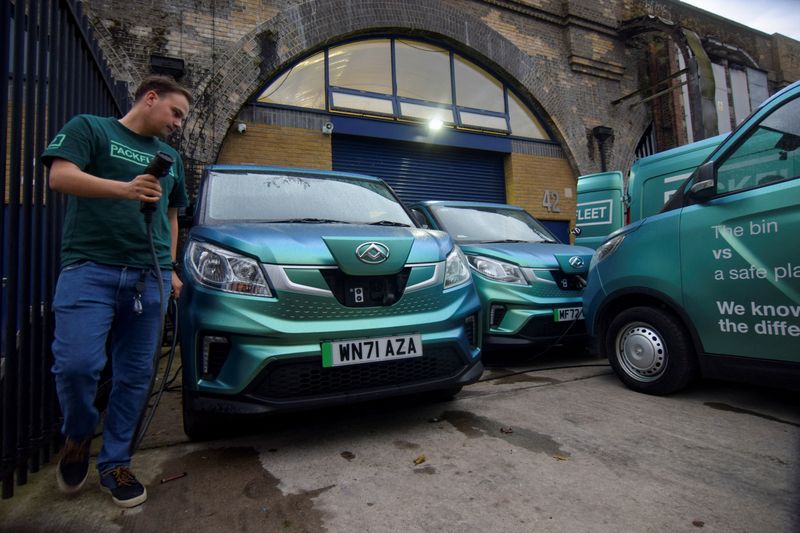By Nick Carey
LONDON (Reuters) - Legacy automakers got off to a late start with their commercial electric vans, opening the door for other electric commercial vehicle (ECV) makers to gain a foothold, as the Maxus brand from China's SAIC Motor Corp has done in Europe.
Fleet customers complain they simply cannot obtain enough electric vans from the likes of Ford Motor (NYSE:F) Co, Stellantis NV brand Peugeot (OTC:PUGOY), Renault (EPA:RENA) or Mercedes, and so they are casting about for alternatives.
The established automakers were slow to embrace electric vehicles, allowing Tesla (NASDAQ:TSLA) Inc to race ahead on passenger cars. With commercial vans, however, they also have dealt with supply-chain challenges.
UK last-mile delivery startup Packfleet uses only ECVs to deliver packages in London for large and small corporate customers seeking a zero-emission experience for consumers.
Packfleet grew tenfold in 2022 and CEO Tristan Thomas said most of the company's 53-vehicle fleet are Maxus vans. The company aims to double its fleet this year.
When the company sought its first ECVs in late 2021, "we basically got laughed out of town by most dealers," with most legacy brand vans on a 12-month back order, he said.
Recently Packfleet has been able to obtain more Peugeot, Ford and Citroen ECVs, but has to move quickly to get them.
"As soon as vans arrive dealers call us and we have to move quickly," Thomas said. "If we don't, they're gone in days."
As fleets shift to zero-emission vehicles, newer brands have a chance to grab market share. Maxus has an advantage while legacy automakers struggle to electrify entire model lineups.
SAIC said it sold 18,000 mostly electric Maxus brand vehicles in Western Europe and Scandinavia last year, including buses and pickup trucks. "We plan to expand further into Central Europe areas," it added.
Electric van market data is scarce, but according to statistics provided to Reuters by the International Council on Clean Transportation, in 2022 Maxus had around 6% of Europe's new ECV market, including the UK, selling nearly 5,000 ECVs. That total is more than Ford, Nissan (OTC:NSANY) or Fiat, and up 28% versus 2021.
Others looking to gain share include Geely's van brand, Farizon, which will start delivering vans in Europe in 2024.
B-ON, which bought the StreetScooter ECV brand from Deutsche Post (OTC:DPSGY) unit DHL, is boosting production in Germany and the United States, while U.S. automaker General Motors Co (NYSE:GM)'s BrightDrop van brand is doing the same at its plant in Ontario, Canada.
"There is no magic wand to fix this, we just need to get the manufacturers up to speed," said Tim Albertsen, CEO of ALD, one of Europe's largest vehicle leasing firms. "For the next couple of years there will not be enough supply of ECVs."
'EXISTENTIAL QUESTIONS'
Seven of UK supermarket chain Asda's eight ECVs are Maxus models, the other is a Ford. Fleet manager Sean Clifton has 50 additional Ford vans and 20 Maxus vans on order, but will need more soon as Asda electrifies its 1,300 delivery vans.
Clifton wants electric Mercedes chassis cab vans, but he said while those were initially slated for 2022, they will not arrive until 2024.
A Mercedes-Benz spokesman said the automaker deliberately focused on ECVs for package delivery first and the chassis cab version will launch on time in 2024.
A spokesman for Italian truck, van and bus maker Iveco Group said it should produce several thousand of its new eDAILY ECV model this year, adding that van production has been hit by component shortages and high raw material costs.
There is no difference in delays for conventional and electric vans at Renault, said commercial vehicle marketing director John Cleworth.
Steven Merkt, head of transportation solutions at major supplier TE Connectivity (NYSE:TEL), said as well as being late with ECV models, legacy automakers are prioritizing big-volume passenger models over vans amid tight EV battery material supply.
"The Chevy Silverado, the Mercedes EQS, the Ford F-150 Lightning, are existential questions for these companies, the vans are not," Merkt says. "If Ford loses that (F-150 Lightning) fight, Ford doesn't exist. That's the reality."
Ford's UK head, Tim Slatter, said the carmaker had underestimated demand for its E Transit and is racing to catch up. Slatter said boosting EV production across an entire model lineup is difficult, which is why, for instance, the carmaker will discontinue its Ford Fiesta (NASDAQ:FRGI) hatchback in Europe this year.
"It's a major challenge and you have to take some tough decisions," Slatter said. "Otherwise you're just spread too thin."
Last week Ford unveiled a new, smaller electric Courier van aimed at winning business customers in Europe, and boxing out startups.
Some electric startups such as Arrival or Canoo, which showed early promise, have burned through mountains of cash and fallen behind.
But Maxus, Farizon and BrightDrop have deep-pocketed backers.
BrightDrop CEO Travis Katz said scaling production is an "incredibly challenging and expensive process," but with GM's backing the company is on track to hit an annual capacity target of 50,000 vehicles by 2025.
After buying StreetScooter, B-ON has retained DHL as an anchor customer. Last year, B-ON produced around 2,500 ECVs and is ramping up production in Germany via contract manufacturer Neapco and in California with EV maker Karma Automotive.
The company is raising $100 million in working capital and within two to three years B-ON expects annual capacity of 60,000 ECVs split evenly between Europe and the United States, said CEO Stefan Krause.
"This will be a supply-driven market for a very long time," Krause said. "There will be a lot of room for many competitors."
